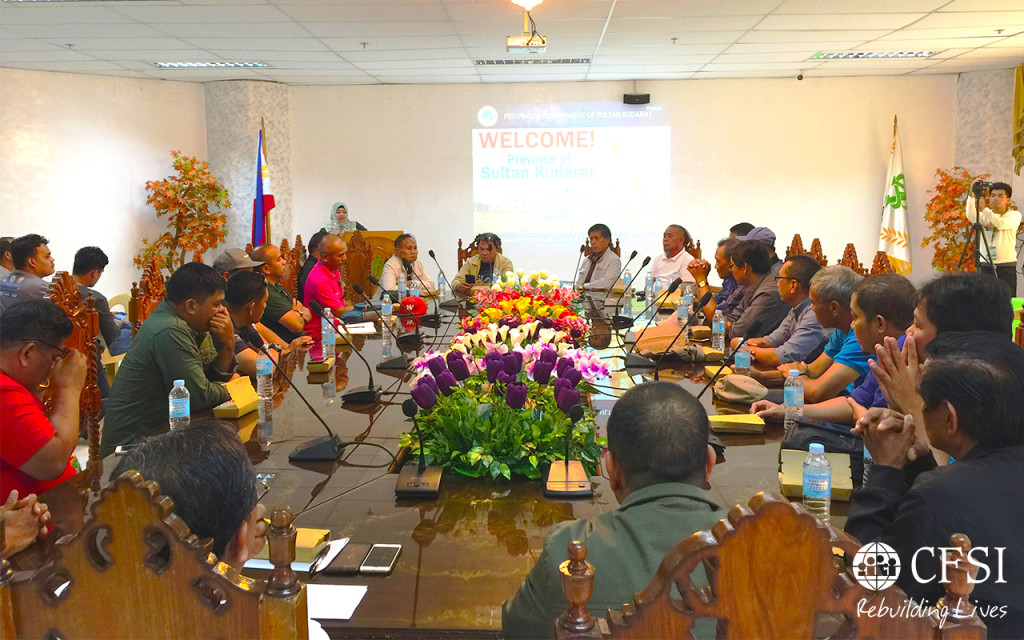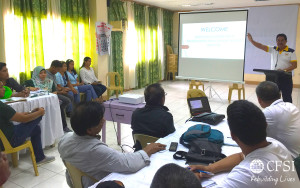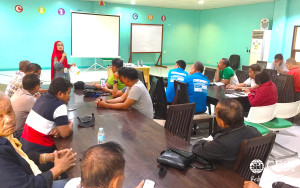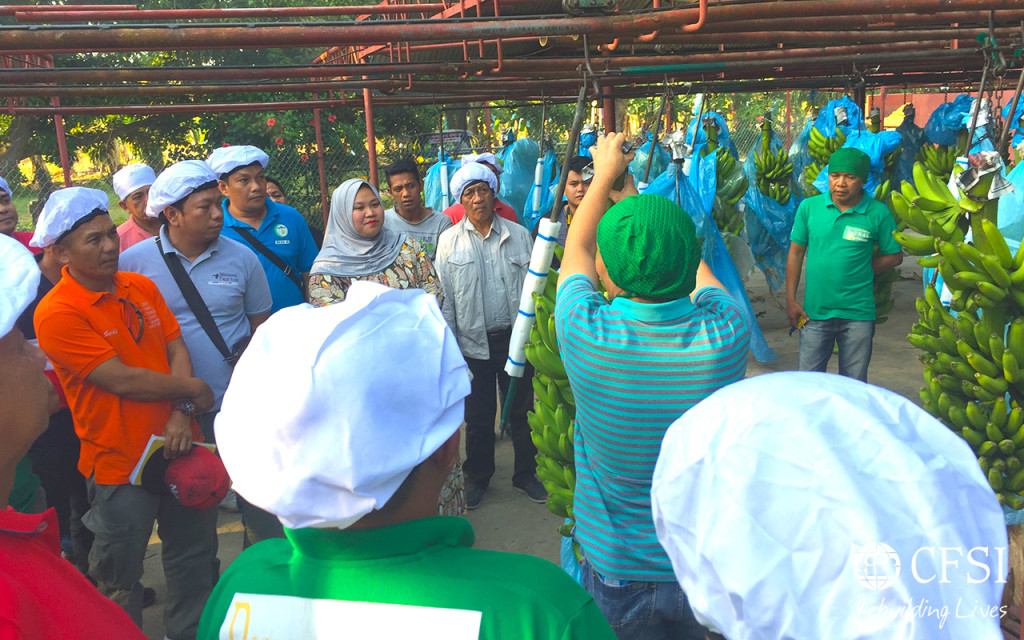On February 13-14, 2019, twenty-two members of the Joint Task Forces on Camps Transformation (JTFCT) together with the Camps Project Support Team (CPST) and the Community Development Officers (CDO) visited various Local Government Units and a private banana plantation company for an experiential learning visit.
This was done as part of the initiatives under the Mindanao Trust Fund-Reconstruction and Development Project Phase II (MTF-RDP/2) where members of the JTFCT are being empowered for project development and management, community organizing, and monitoring and evaluation of projects.
The JTFCT is comprised of representatives of the six previously acknowledged camps of the Moro Islamic Liberation Front (MILF) and has been entrusted to manage the socio-economic development sub-projects within their camps.
The MTF-RDP/2, funded by The World Bank through the Mindanao Trust Fund (MTF), is a program implemented through a project partnership agreement between the Community and Family Services International (CFSI) and the Bangsamoro Development Agency (BDA). This seeks to improve access of identified beneficiary communities in conflict-affected areas in Mindanao to basic socio-economic infrastructure and alternative learning system.
The Experiential Learning visit, which aims to deliver insights and knowledge on the processes of governance and operations, took place in the Municipality of Upi, Province of Sultan Kudarat, General Santos City, and the La Frutera Incorporated in Datu Paglas, Maguindanao.
Mayor Ramon Piang of Upi graced the visiting team in their first stop as he presented the profile of the municipality and the various development projects currently being undertaken. When asked about the accomplishments of their municipality, he answered, “The key to successful and sustained good governance is the commitment of the officials and department heads.”
Engr. Paul Cagara, Municipal Planning and Development Coordinator of the Municipality of Upi, highlighted in his presentation their different programs and good practices. He underlined the formulation of the Municipal People’s Council composed of elders from various tribes who settle local disputes. He also shared how empowered and active the Civil Society Organizations (CSO) are in terms of governance and decision-making. Some of their distinct systems include: the DXUP Community Peace Radio, the advocacy center of the LGU; the Community E-Center; the MEGUGAYA Festival; and the Upi Youth Governance.
Hadji Olem Hassan, Co- chairman of the JTFCT, expressed appreciation to the Upi LGU for the warm accommodation, describing the Municipality as the “University of Good Governance.” In his message, he encouraged JTFCT members to replicate what the Bangsamoro Mayor had actualized now that the new government is taking place. “What can the North Upi do that we cannot execute?” he stressed. “We should uphold the trust that the people have given us,” he ended.
“How can the MILF or BARMM replicate same? It is to ‘walk the talk’,” the Mayor added with the suggestion to maintain the current trust and confidence rating of Moro Islamic Liberation Front (MILF) with the soon implementation of Bangsamoro Autonomous Region.
On the afternoon of February 13, the team proceeded to Isulan, Sultan Kudarat. Jimmy Andang, the Provincial Administrative Officer, welcomed the delegation and shared his insights being a Bangsamoro himself.
The Provincial Government team presented the provincial socio-economic profile, development projects, and best practices in support to the thrust of the provincial government. This was followed by the presentation of the ISO protocols done by the head of the Internal Quality Assurance team of the province. The PLGU was issued the ISO certification in 2014 and was re-certified in 2018. Being ISO certified entails better services to the constituents commensurate to transparency, accountability, good governance and delivery of basic services to the people. Sultan Kudarat Province is the first PLGU in Mindanao that was issued ISO accreditation.
An Open Forum followed and was facilitated by Provincial Planning and Development officer Engr. Romeo ZAragosa. The JTFCT members interacted by asking questions on the processes of scholarship grants and the law of the land.
The City Government of General Santos accommodated the team on its second and final day of exposure trip. The City LGU staff presented the profile of the city, its major programs and projects and unique investments that the city LGU has provided to its constituents. The tri-people populace was also given due emphasis in its development interventions.
Jocelyn Kanda, one of the Executive Assistants of the City Mayor for Indigenous People and Muslim Affairs, briefed the team on how the LGU had provided interventions to these particular sectors of the city. Dr. Bai Janina Tito, former ARMM DePEd Secretary and now the Executive Assistant of the City Mayor for Senior Citizens Affairs, entertained several questions from the JTFCT members. She also shared that the secret to peace and development is to realize that we co-exist with one another.
Before the interaction with GenSan LGU, the JTFCT members also had a quick visit to the GenSan Fish Port Complex to observe the practices on the facility and the fishing production itself, which is considered as one of the city’s prime industries.
The learning trip concluded with the visit to the La Frutera office and plantation where they were welcomed by the management with Municipal Mayor Abubakar Paglas, the former CEO. He shared some unrevealed history of the company and several tips in banana plantation. The current operation of the company was disclosed by Mr. Edilbert Contiga, Conformance Manager. It was also learned that the start of the company was closely coordinated with the late MILF Chairman Sheikh Hashim Salamat.
The activity was wrapped-up with the visit at the packing house where the learning team had personally witnessed the highly mechanized process. They exhibited the big refrigerated container vans which ensure the quality of the bananas shipped to other countries such as Japan, Korea, Saudi Arabia and others. These refrigerated vans will retardate the ripening process of the banana sent to the identified markets.
The experiences and good practices that the JTFCT members have gained from the learning exposure trip are considered as effective strategies for them to generate fresh information and knowledge directly from the implementers’ side for the upcoming Bangsamoro Autonomous Region in Muslim Mindanao (BARMM).
—
The MTF is a multi-donor trust fund supported by donors such as the European Union, the government of Sweden, Australia, Canada, United States, New Zealand and the World Bank. The World Bank functions as Trust Fund Administrator of the MTF.
In support to the objectives of the MTF-RDP/2, the Spanish Agency for International Development Cooperation (AECID) provided complementary assistance directly to CFSI through the project referred to as “Supporting Access to Basic Services and Building Institutional Capacity in Conflict Affected Areas in Mindanao or MTF-RDP/2-AECID.”





